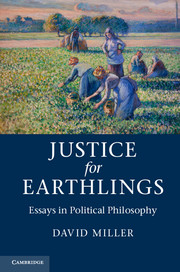Book contents
- Frontmatter
- Contents
- Acknowledgements
- Introduction
- 1 Political philosophy for Earthlings
- 2 Two ways to think about justice
- 3 Social justice in multicultural societies
- 4 Liberalism, equal opportunities and cultural commitments
- 5 Equality of opportunity and the family
- 6 Justice and boundaries
- 7 Social justice versus global justice?
- 8 ‘Are they my poor?’: the problem of altruism in a world of strangers
- 9 Taking up the slack? Responsibility and justice in situations of partial compliance
- 10 A tale of two cities; or, political philosophy as lamentation
- Index
- References
10 - A tale of two cities; or, political philosophy as lamentation
Published online by Cambridge University Press: 05 February 2013
- Frontmatter
- Contents
- Acknowledgements
- Introduction
- 1 Political philosophy for Earthlings
- 2 Two ways to think about justice
- 3 Social justice in multicultural societies
- 4 Liberalism, equal opportunities and cultural commitments
- 5 Equality of opportunity and the family
- 6 Justice and boundaries
- 7 Social justice versus global justice?
- 8 ‘Are they my poor?’: the problem of altruism in a world of strangers
- 9 Taking up the slack? Responsibility and justice in situations of partial compliance
- 10 A tale of two cities; or, political philosophy as lamentation
- Index
- References
Summary
In ad 410 the city of Rome was captured by Alaric and the Visigoths, who entered the city after several sieges, ransacked the main buildings and drove tens of thousands of its citizens into the countryside. Such an event had not occurred for nearly 800 years. Three years later, Augustine, Bishop of Hippo, began to write the bulky manuscript that eventually saw light as The City of God against the Pagans. Augustine's main purpose in writing this book was to rebut the claim that it was the adoption of Christianity that had led to Rome's downfall; had Romans remained loyal to their ancient gods, his opponents argued, they would also have retained the virtues that had made the city such a formidable power in centuries past. But there were many other sub-themes as well, some of them abstrusely theological. The one on which I wish to focus is Augustine's attempt to bring a kind of consolation to those to whom the fall of Rome had come as a devastating blow. No earthly city, Augustine claims, can provide human beings with the goods that really matter to them, even though it can provide for the material needs of the body. What is important above all is to achieve the spiritual state that allows one to participate in the City of God.
This introduces what is perhaps the most famous motif in Augustine's book, the contrast between the earthly and heavenly cities. Belonging to the earthly city is a necessity for fallen mankind, since it discharges essential functions such as providing security and protecting property. But each person also has a chance to become a pilgrim on the road to the heavenly city, though he can only belong to it entirely when he joins the saints and the angels in the hereafter. He does so to the extent to which he achieves true godliness, in which case he belongs for the moment to both cities at once.
- Type
- Chapter
- Information
- Justice for EarthlingsEssays in Political Philosophy, pp. 228 - 249Publisher: Cambridge University PressPrint publication year: 2013
References
- 6
- Cited by



